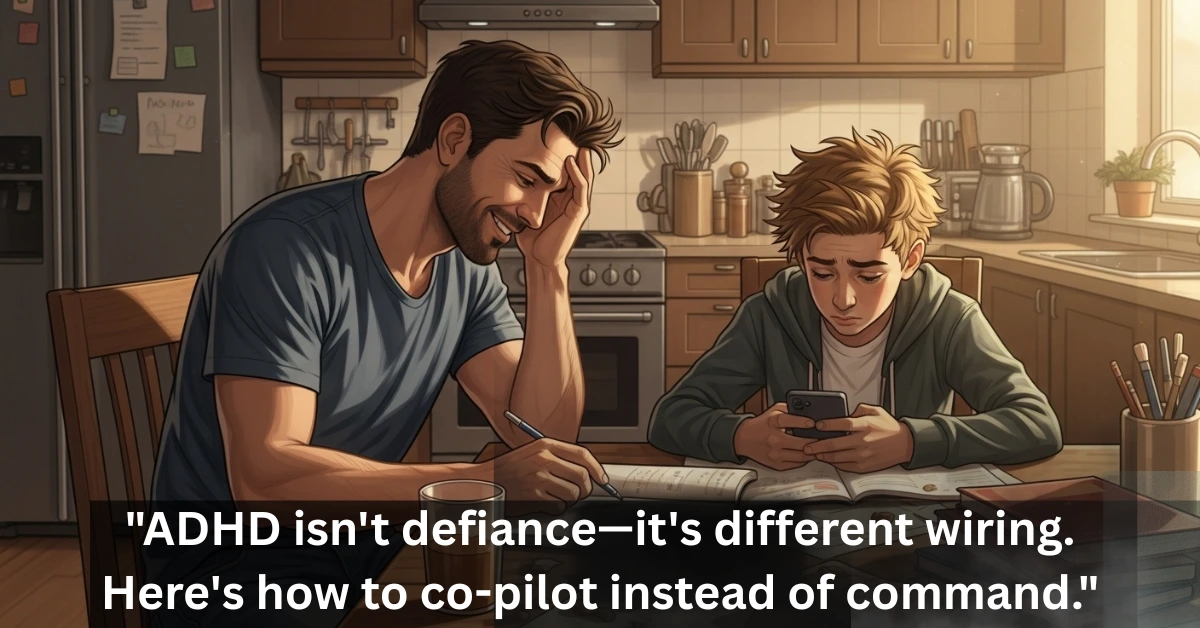Your ADHD Child Isn’t Giving You Hell—His Brain Is
Picture this domestic tableau, familiar as morning coffee and twice as bitter: It’s 7:30 PM, that cursed hour when homework transforms normal families into warring factions. You’ve explained long division with the patience of a saint and the growing desperation of a hostage negotiator.
Your son—bless his chaotic little heart—has managed to turn a pencil eraser into a tiny bouncing ball, discovered that his shoelaces make interesting patterns when twisted, and just asked, with genuine scientific curiosity, whether sharks get sunburned.
If you’re desperately searching for ADHD parenting strategies for dads that actually work—strategies that don’t involve mystical sticker charts or threats of grounding—you’ve likely reached that breaking point where traditional parenting advice feels about as useful as a chocolate teapot. The moment you feel that hot spike of failure rise in your throat, convinced you’re a uniquely terrible father presiding over chaos you somehow created through mysterious parental incompetence.
Most ADHD parenting strategies for dads you’ll find online read like they were written by people who’ve never actually met a child with ADHD, let alone tried to convince one to put on matching socks.
Let me save you some time and considerable anguish: You’re not going crazy, and you’re not a bad parent. The problem is that you’ve been given the wrong user manual—much like trying to operate a Tesla with instructions written for a 1987 Buick. You’re attempting to run standard parenting software on completely custom hardware.
The Science Behind ADHD: Understanding Your Child’s Brain
Working Memory: The Mental Workspace Challenge

The research is unambiguous, even if the dinner table feels like anarchy. Attention-Deficit/Hyperactivity Disorder makes it brutally clear that ADHD is one of the most heritable psychological conditions known to science. When one identical twin has ADHD, the other twin has it up to 92 percent of the time. This isn’t a flaw in your parenting—it’s a feature of your kid’s executive function system.

Working memory is the foundation of effective ADHD parenting strategies for dads to understand. Picture a mental workspace where your brain temporarily holds information while doing… well, anything. A neurotypical brain has a large, well-organised workspace with labelled drawers and sufficient lighting.
A brain with ADHD has a workbench the size of a sticky note that is also on fire.
This is why that simple, five-step instruction you gave—”Go upstairs, put your dirty clothes in the hamper, brush your teeth, get your backpack, and meet me at the door”—is doomed from the start. By the time he reaches the top of the stairs, the mental workspace has crashed, and now he’s dismantling the smoke detector because it looks interesting.
Volitional Inhibition: The Broken Brake System

The second critical concept is volitional inhibition—the clinical term for “the ability to hit the brakes.” Dr. George Still, who first described ADHD symptoms in 1902, called it a “defect of moral control,” though he suspected it had a biological basis rather than being a character flaw.
When your kid blurts out a brutally honest, socially catastrophic thing in front of your boss? When he sprints across the living room because an idea just hit him? That’s not him choosing to be “bad.” That’s a brain whose accelerator is welded to the floor while the brake lines have been snipped. He doesn’t need you to yell at him for speeding; he needs you to help him learn where the emergency brake is.
Why Traditional Parenting Methods Fail with ADHD Kids
The Hardware vs. Software Problem
This is why the advice from the peanut gallery—your well-meaning mother-in-law, that smug dad from the playground, the Facebook parenting groups—is so infuriatingly useless when raising a child with ADHD.
“He just needs more discipline.” “Have you tried taking away his video games?” “My daughter was like that, but then we discovered organic, gluten-free sticker charts.”
These people are trying to fix a hardware problem by yelling at the software—a technique about as effective as lecturing a toaster for burning your breakfast. It’s like screaming at your Tesla because it won’t run on coal. The ADHD parenting strategies for dads coming from well-meaning relatives belong in a museum of misguided advice, somewhere between “rub dirt on it” and “have you tried turning him off and on again?”
They’re operating under the assumption that your child is a poorly behaved neurotypical kid rather than a perfectly behaved neurodivergent one. It’s a category error of the highest order, and it’s leaving you exhausted and your kid bewildered.
The School Meeting Reality Check

I once witnessed this play out at a school meeting. The teacher, bless her heart, suggested that if my friend’s son would “just try harder to pay attention,” his grades would improve. She said this while he was crawling under the conference table, having spotted a dropped pen that had become more interesting than the entire conversation about his academic future.
Here’s what I wanted to say:
“Ma’am, asking his son to ‘try harder’ to pay attention is like asking someone with nearsightedness to ‘try harder’ to see the blackboard. The problem isn’t effort. The problem is equipment.”
Your Real Job as an ADHD Dad: External Executive Function
From Drill Sergeant to Co-Pilot

Here’s where most ADHD parenting strategies for dads get it spectacularly wrong: they position you as the disciplinarian, the enforcer, the guy whose job is to make the chaos stop through sheer force of parental will. Your job isn’t to be the drill sergeant. Your kid has a drill sergeant in his head, but he’s yelling contradictory nonsense in three different languages while simultaneously setting off fireworks. Your job is to be his external executive function. You are his co-pilot. His navigator. You are the workbench he doesn’t have.
This sounds noble and therapeutic, but let me tell you what effective ADHD parenting techniques look like in practice:
Morning Routine Management:
- You become a human alarm system, not because he can’t hear the clock, but because time is an abstract concept to his brain
- “Five more minutes” might mean ten seconds or forty-seven minutes, depending on what neural rabbit hole he’s fallen into
Homework Supervision:
- You break five steps down into one. And then the next one. And the next
- You create routines so ingrained that they become muscle memory, bypassing the faulty working memory altogether
Social Situation Navigation:
- You become a real-time translator for behaviour regulation
- When he interrupts adults for the fifteenth time, you don’t shame him—you quietly remind him that his brain gets excited about ideas
Time Management Systems:
- You externalise time with visual timers, making “five minutes” a concrete concept rather than an abstract space
- Visual schedules become your best friend, making the invisible visible
Dad-Tested ADHD Parenting Strategies That Actually Work
The One-Thing Rule: Single-Task Success
Here’s where we abandon the theoretical nonsense and get into the practical ADHD parenting strategies for dads that have been battle-tested in the trenches of actual family life—strategies developed by fathers who’ve survived homework meltdowns, morning routine disasters, and the particular brand of chaos that comes with loving a beautifully unpredictable ADHD brain.
Never give more than one instruction at a time.
Ever.
“Go brush your teeth” is a complete mission. When that’s done, you can assign the next task. His brain can’t queue functions like a computer; it can only run one program at a time.
Implementation Example: Instead of: “Get ready for school—brush teeth, get dressed, pack backpack, and eat breakfast.” Try:
“First thing: brush your teeth. Come find me when you’re done.”
The External Brain System
Everything necessary gets written down, posted visually, or set with alarms. His sports schedule, homework assignments, and even which backpack to take—all of it lives outside his head until the habits become automatic.
Practical Tools:
- Visual schedules with pictures for younger kids
- Colour-coded calendars for different activities
- Smartphone alarms with specific labels
- A checklist posted at eye level in his room
The Reset Ritual: Emergency Protocols
When the wheels come off (and they will), you have a family reset protocol in place. It could be a five-minute walk around the block, maybe everyone sitting on the floor doing deep breathing. The key is that it’s predictable and doesn’t involve shame or blame.
Sample Reset Sequence:
- Call “family reset time”
- Everyone takes three deep breaths together
- Brief 2-minute break with no talking
- Return to task with a simplified approach
Success Translation: Celebrating Executive Function Wins
When he accomplishes something neurotypical kids take for granted—like remembering to bring his homework folder home—you acknowledge the executive function triumph it represents. Not with empty praise, but with recognition of the specific skill he just demonstrated.
The Grief No One Talks About: Processing Your Parenting Reality
Mourning the Easy Kid You Expected
Here’s the part that nobody talks about in parenting books: You have to grieve the easy kid you thought you’d have.
You know that dad—the one whose biggest parenting challenge is choosing between soccer camp and swimming lessons. The one who casually mentions at barbecues that his kid “just naturally stays organised” and “has always been self-motivated.” You hate that dad a little bit, don’t you?
The Baseball Game Epiphany

I remember a friend telling me of watching other fathers at youth baseball games, sitting relaxed in their folding chairs, occasionally glancing up from their phones to cheer on their children. Meanwhile, he was perched at the edge of the dugout, providing a steady stream of whispered reminders: “Keep your eye on the ball. Remember what the coach said. Stay in ready position.”
He wasn’t enjoying the game. He was managing a complex support system in real-time, and he was bitter about it.
The grief is real, and it comes in waves. Grief for the parenting experience you expected. Grief for the ease with which other families seem to have. Grief for your childhood dreams of effortless father-son bonding.
The Other Side of Grief: Deeper Connection
But here’s what he told me he learned: On the other side of that grief is something most fathers never get to experience. You become an expert on your kid’s inner workings in a way that “easy” parenting never demands. You develop a collaborative relationship built on problem-solving rather than simple authority.
When your ADHD kid finally masters something—really masters it—you both know exactly how much work it took. The victory belongs to both of you.
Building Long-Term Success: The ADHD Advantage
Reframing the Narrative
Here’s what the conventional wisdom—and most ADHD parenting strategies for dads—gets backwards: they treat ADHD like a broken part that needs fixing, rather than recognising it as a different operating system that requires different software. Children with ADHD often become incredibly successful adults, not despite their neurology, but because of it. The same brain that can’t remember to put on shoes can also hyperfocus on solving complex problems for hours, disappearing into creative projects with the intensity of a research scientist on the verge of a breakthrough. The same impulsivity that drives you crazy during homework becomes entrepreneurial boldness in adulthood—the willingness to take risks that more cautious minds avoid.
Your Mission: Building Better Brakes

Your job isn’t to “fix” this brain. Your job is to help your child build the scaffolding and systems that will enable this brain to thrive. The researchers are clear: ADHD isn’t a deficit disorder. It’s a different disorder.
You are the father to a child with a supercar engine for a brain, which is both glorious and terrifying. But it was installed with bicycle brakes. The world will tell you to tame the engine. Your job is to help him build better brakes.
Daily Routine Templates for ADHD Success
Morning Routine Checklist
- Visual timer set for each activity (10 minutes getting dressed, 5 minutes brushing teeth)
- Clothes laid out the night before
- Backpack packed and by the door
- Breakfast choice predetermined
- One parent is designated as the “morning manager”
Homework System Setup
- Same time, same place, every day
- All supplies are in the designated homework caddy
- Phone/tablet in a different room
- 20-minute work blocks with 5-minute breaks
- Parent nearby but not hovering
Bedtime Protocol
- One-hour wind-down period starts at the same time
- Visual schedule showing each step
- Electronics off 30 minutes before bed
- Calm music or white noise
- Brief review of tomorrow’s plan
When to Seek Professional Support
Red Flag Indicators
- Aggressive behaviour that escalates despite consistent approaches
- Severe anxiety or depression symptoms
- Academic performance is declining significantly
- Social isolation or friendship difficulties
- Family stress affecting marriage or other children
Professional Resources to Consider
- Pediatric neuropsychologist for comprehensive testing
- ADHD coach for skill-building
- Family therapist experienced with neurodivergent families
- School psychologist for educational accommodations
Conclusion: The Better Path Forward
These ADHD parenting strategies for dads aren’t about perfection—they’re about understanding that you’re playing a completely different game than the fathers around you. While other dads worry about soccer schedules and screen time limits, you’re building the cognitive scaffolding that will determine whether your child thrives or struggles for the rest of his life.
It’s a more complex, more frustrating, and more noble job than you ever signed up for. It will break your heart, but it will rebuild it stronger. It will teach you patience you didn’t know you had and humble you in ways you needed.
When you see your kid finally understand how his brain works—when he develops his systems and starts advocating for himself—you’ll realise something profound: You didn’t just raise a child with ADHD. You raised a young person who understands his neurology, can build systems to support his strengths, and won’t spend his adult life wondering what’s wrong with him.
These ADHD parenting strategies for dads aren’t the easy path. But they might be the better ones. Now be the mechanic your kid needs, not the one everyone else thinks he deserves.
Frequently Asked Questions About ADHD Parenting for Dads
What are the most effective ADHD parenting strategies for dads?
The most effective strategies include implementing the one-thing rule (giving only one instruction at a time), creating external brain systems with visual schedules, establishing reset rituals for challenging moments, and serving as your child’s external executive function rather than relying on traditional discipline methods.
Why do traditional parenting methods fail with ADHD children?
Traditional parenting methods fail because they’re designed for neurotypical brains. ADHD children have differences in working memory and volitional inhibition (impulse control) that make standard discipline ineffective. It’s like trying to fix a hardware problem with software solutions.
How can fathers cope with the emotional challenges of ADHD parenting?
Fathers need to process the grief of not having the “easy” parenting experience they expected. This involves accepting that their role is more like that of a co-pilot and an external executive function for their child, which ultimately creates a deeper, more collaborative relationship.
What daily routines work best for children with ADHD?
Effective routines include using visual schedules, maintaining consistent timing, breaking tasks into single steps, utilising external timers, and having all necessary items prepared in advance. The key is to make abstract concepts, such as time and sequences, concrete and visible.
When should dads seek professional help for ADHD parenting challenges?
Seek professional support when aggressive behaviour escalates despite consistent approaches, when academic performance declines significantly, if anxiety or depression symptoms appear, or when family stress begins affecting other relationships. Professional resources include ADHD coaches, pediatric neuropsychologists, and family therapists experienced with neurodivergent families.


